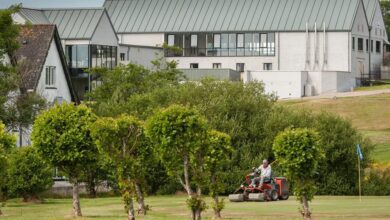How foraging can play a part in a luxury hotel restaurant
By Craig Davies, the executive chef at Burgh Island Hotel

When we think about foraging for food, we probably conjure images of produce in meagre volumes and insubstantial variety – it certainly wouldn’t evoke connotations of luxury. But foraging can be an invaluable tactic in the playbook of hospitality businesses catering to large, luxury clientele by responding to increasing consumer demand for local, sustainable, and plant-based cuisines.
Moreover, the environmental advantages, and the enhancement of the guest experience, mean putting foraged food on the menu can bring with it a true cornucopia of unexpected benefits for hoteliers and restaurateurs alike.
Foraging and using locally sourced food is a unique way to help your hotel stand out from the crowd when holidaymakers are picking their next destination. Recent years have seen a swift growth in the popularity of foraging, turning what was once the pursuit of the few into a trend capturing the imaginations of many. Indeed, a recent survey indicated a 90% increase in social media interest around the activity. As more and more individuals become fascinated by this age-old pastime, hotels that engage in foraging and incorporate the fruits of this labour into their menus set themselves up to bring in a new age of nature-loving guests.
Return to your roots
Foraging starts at home. Indeed, practising with homegrown produce is the best way to attune your senses, bringing a new element of procuring and planning to restaurant kitchens.
Time-sensitive wild ingredients require extra creativity and care. It’s no surprise that chefs who forage ingredients are changing the ways restaurants operate. Collectively, if chefs can get creative in the kitchen, then they can do the same in the garden, growing ingredients which bolster the palate of their dishes.
At Burgh Island, for example, the catering team works closely with the resident gardener to cultivate a diverse array of produce which compliments the other elements of the hotel’s bespoke menus. But home-growing does not have to begin and end with fruit and veg, as hotels such as Heckfield Place now use their own garden produce to enhance an array of drinks they create in- house. The fruits of foraging can therefore be a surprisingly versatile resource.
In 2023, an encouraging 70% of Britons said they wanted to eat more seasonally. By incorporating foraged ingredients into their menus, hotels can help visitors do just that, while at the same time endearing themselves to this growing number of seasonal food lovers.
A sustainable appetite
As of this year, transportation alone accounts for 19% of the greenhouse gas emissions created globally by the food and drink industry. Moreover, the movement of fruit and vegetables alone makes up 36% of food mile emissions. Gradually, the world has come to understand the value of reducing our carbon footprint, and cooking with foraged and locally sourced produce is a crucial way for hotels and restaurants to do this.
The UK produces only 18% of the fruit we consume. This means that the vast majority of our fruit is imported from overseas, at the expense of the environment. Hotels that prioritise locally produced, and in particular, foraged foods can help to increase this percentage and offset our impact on the natural world. In 2021, the Michelin Guide established a green star rating for highly sustainable restaurants; the vast majority of recipients serve foraged food.
At Burgh Island, for example, locally sourced produce is a key ingredient of our cuisine, such is the hotel’s commitment to promoting sustainability and strengthening its bonds with the local community. Roughly 80% of the hotel’s produce comes from within a 30-mile radius, including free-range meat from Aune Valley (five miles), lobsters and scallops from Beesands (10 miles), and oysters and mussels from the Avon Estuary, directly opposite the island.
Foraging locally allows both hotels and their guests to benefit from the satisfaction of making delicious food sustainably.
Five-star foraging
As Britain gains a newfound love for foraging, and individuals turn back to the natural world for their produce, hotels that practise food gathering should make the most of this growing popularity.
Besides simply advertising the origins of ingredients on their menus, hoteliers can help guests to embrace this activity by offering foraging lessons and wilderness walks to explore and collect what can be gathered from the local area. By doing so, hotels appeal to the 39% of travellers who said that they would like to learn how to forage for food during their trip away this year. Incorporating foraging into a kitchen, as well as the overall guest experience, brings with it a veritable feast of advantages – from supporting sustainability to enhancing a visitor’s stay.
For hotels such as Burgh Island, which is surrounded by a unique and bountiful natural landscape, a sprinkle of this activity can provide an enchanting way to create high-quality food, without going the extra mile.









